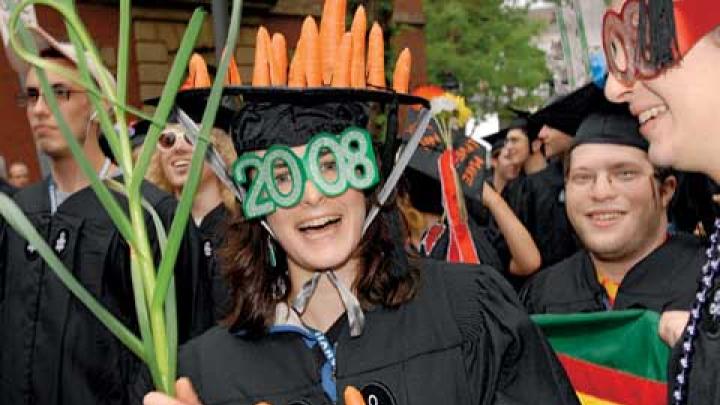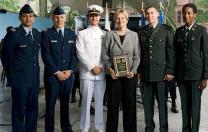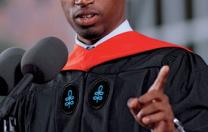A nation at war, an unsettled economy, a lengthy presidential campaign: inevitably, Harvard’s 357th Commencement touched on some of these concerns. On Wednesday, June 4, President Drew Faust’s remarks at the Reserve Officers’ Training Corps commissioning ceremony necessarily addressed matters military—as did the graduate English address by Iraq veteran Anthony C. Woods at the morning exercises next day (see "Talk, Part I: On Service to Country"). Wednesday afternoon, principal Class Day speaker, Ben S. Bernanke ’75, chairman of the Board of Governors of the Federal Reserve System, honored his audience with a serious analysis of contemporary inflation, productivity, and monetary policy, even as Harvard Kennedy School’s graduation speaker, Ellen Johnson Sirleaf, M.P.A. ’71, a pioneering president of Liberia, noted another momentous event: “Who would have thought that a minority, albeit a Harvard graduate, would change forever the American political landscape?” Barack Obama, J.D. ’91, had clinched his party’s presidential nomination the night before.
But Commencement at heart is a celebration of Harvard and a festive rite of passage for the students (of diverse ages and disciplines) who have entered to grow in wisdom. So it was this year as well.
Now 372 years old, the University showed its knack for newness in a fistful of firsts. The conferral of degrees began when Michael D. Smith, in his first Commencement as dean of the Faculty of Arts and Sciences, addressed “Madam President, Fellows of Harvard College, Madam President and Members of the Board of Overseers.” The first degrees actually conferred by Faust as “Madam President” were to candidates from the School of Engineering and Applied Sciences—the University’s newest school, elevated from divisional status just last autumn. (Presenting dean Venkatesh Narayanamurti’s first appearance in the role was also his last; he steps down in September.) Other newcomers included the deans of the Graduate School of Arts and Sciences, Harvard Medical School, the Graduate School of Design, and—in her first week in office—Harvard College (Evelynn M. Hammonds, the first woman and African American to hold the post).

Photograph by Jim Harrison
Masters of theology Quardricos Bernard Driskell, of Atlanta, and Elizabeth Siwo-Okundi, a native of Kenya now living in Boston.
Hinting at things to come, Faust invoked the power of ritual twice during the morning ceremony. She had to admonish the cheering Ph.D. and Kennedy School candidates to wait for their moment, saying to the former, “I’m not done!” and telling the latter, “I have to say the words!” Conferrals of degrees, like magic spells, must be done strictly to form.
Otherwise, the events proceeded like a finely tuned clock, despite extraordinary recognition for two individuals and the awarding of fully 10 honorary degrees (see "Honoris Causa"). The celebratory peal that regularly booms from the Memorial Church belfry at the end of the morning ceremonies was absent; it’s timed for 11:45 a.m., when the exercises have previously ended. This year, relieving the damp and chilly throng, they ended 15 minutes early.
In her institutional role, Faust closed the academic year by reprising a theme from her installation address last October (see “Twenty-eighth, and First,” November-December 2007, page 54). Then, she said, “The essence of a university is that it is uniquely accountable to the past and to the future—not simply, or even primarily, to the present.” This Commencement afternoon, she addressed head-on what she called Harvard’s “public boundary” and, in particular, “questions about the role and purposes of universities”—as exemplified by congressional queries about academic finances and endowments; lessened federal funding for research; and heightened discussion about the costs of and access to higher education.

Photograph by Stu Rosner
President Faust addresses the alumni gathering.
Endowments, Faust said, “represent a concrete embodiment of our accountability to the past and to the future. They derive from our history and the dreams of those who have preceded us; they are in turn the vehicle that enables us to project our own dreams into the future.
“The endowments at Harvard and other great universities,” she continued, “have created a system of higher education that is the envy of the world. It has opened doors of opportunity ever more broadly; it has generated powerful new understandings about human nature and the world we inhabit; it has fueled revolutionary advances in science; it has helped drive economic growth and expansion in our nation and the world.” Were those resources diminished, she said, “we would have to do less—less research, less teaching, at a lesser level of quality—or we would have to generate more income from other sources—tuition increases or external funding.” Now, when “knowledge is increasingly important, our accountability to the future challenges us to do not less, but ever more….” (The speech appears at harvardmag.com/commencement; for more on these issues, see "Endowments—Under a Tax?", page 65)
Faust had ad-libbed that she was “the warm-up act,” referring to her successor at the lectern, J.K. Rowling. And indeed, the Harry Potter author cast her spell over Harvard—although perhaps not as her fans expected.

Photograph by Jim Harrison
Suitably propped are (from right) Joseph Foster Robbins ’36 and his wife, Jayne, of Wenham, Massachusetts; Thomas Allen ’36 and his wife, Judy Welke, of Newtonville, Massachusetts; Jeremy Gilmore; and the broom-brigade organizer, Gerald Gilmore ’36, of South Orleans, Massachusetts.
The University had prepared for her arrival. The Wednesday banquet for honorands in Annenberg Hall usually features dozens of small tables; this time, guests dined in long rows—a bow to Hogwarts. When it came time for her to speak on behalf of the other honorary-degree recipients, Rowling said, “I never dreamed that Harvard would feel so familiar.” She said that Harry Potter’s magic broom had carried her around the world to unexpected places, but that this honor was “the greatest and most intimidating”—a disarming admission. (Asked the next morning about the unfolding graduation scene, Rowling replied, “It’s a little better organized than Hogwarts, I’d say.”)
Much of the week’s best rhetoric focused on a potentially hackneyed subject: what sort of people the privileged new graduates would become. Faust had fresh things to say in her Baccalaureate talk on Tuesday afternoon, and Bernanke ended his academic text on a personal note, addressing the same concerns (see "Talk, Part 2: “Life Is Not a Check-list,” pages 54-55).
But Rowling, to whom both unimaginable wealth and celebrity had come unexpectedly, seemed to model the matter even more directly. At the chief marshal’s Commencement luncheon, she recalled that when filmmaker David Heyman ’83 (whose firm produces the Harry Potter movies) approached her on Harvard’s behalf to offer an honorary degree, she asked for a week to think it over. That she had accepted meant “I was more honored than terrified.” Three hours later, Rowling won over the Tercentenary Theatre crowd, confessing, “I have wracked my mind and heart for what I ought to say to you today.”
It is Rowling’s gift (see page 55) to draw universal life lessons from her own discoveries—of personal failure “on an epic scale,” and, from a day job at Amnesty International, “evidence about the evils humankind will inflict on their fellow humans, to gain or maintain power.” And yet, “I also learned more about human goodness…than I had ever known before.” Of those who “prefer not to exercise their imaginations at all,” who “choose to remain comfortably within the bounds of their own experience,” Rowling said, “I do not think they have any fewer nightmares than I do.…I think the willfully unimaginative see more monsters.”
Quoting Plutarch, she said, “What we achieve inwardly will change outer reality.” In a final challenge, the 42-year-old Rowling—seeming too young and too slight for the weight of her words—told the graduates, “If you choose to use your status and influence to raise your voice on behalf of those who have no voice; if you choose to identify not only with the powerful, but with the powerless; if you retain the ability to imagine yourself into the lives of those who do not have your advantages, then it will not only be your proud families who celebrate your existence, but thousands and millions of people whose reality you have helped transform for the better. We do not need magic to change the world, we carry all the power we need inside ourselves already: we have the power to imagine better.”
In honoring Rowling for igniting in millions the passion to read, Harvard discovered that it had also welcomed a teacher beyond compare.

 ,
,








